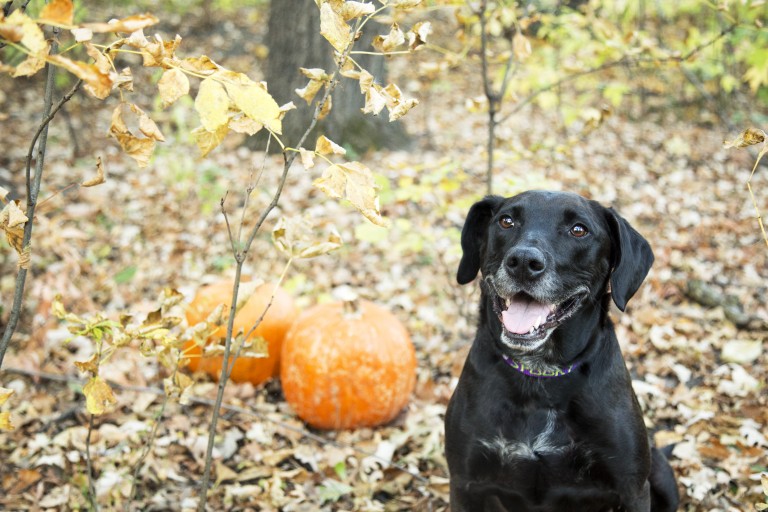At dogIDs we are all about improving the lives of dogs. Because of this, we have many people ask us health questions about their dogs. One of the most common questions that you ask is about healthy superfoods for dogs. Specifically, you ask if your dog can eat pumpkin. The short answer is yes!
Pumpkin For Dogs - The Ultimate Pet Superfood
Here's the long answer:
Pumpkin has many health benefits for dogs and is one food that pet owners can feel confident about safely adding it to their dog’s regular diet.
Pumpkin is incredibly nutritious, easy to prepare and has almost no side effects.
So here is everything you need to know about pumpkin for dogs.
This guide is here to answer two basic questions.
Is Pumpkin Good For Dogs?
Can Dogs Eat Pumpkin?
The short answer is YES to both of these questions.
Pumpkin is very nutritious for dogs. But be careful, not all pumpkins are created equal.
The pumpkin that you carve for Halloween, for example, is potentially full of mold and bacteria after it’s been sitting on your front porch for several weeks. It’s not a good idea to feed any pumpkin you are using as decor to your dog. Don't take the risk.
Instead, use the seeds and the flesh of FRESH pumpkins. These are both safe for your dog. Pumpkin can go rancid very quickly so if you choose to serve raw pumpkin it’s vital that it is the freshest you can find.
As we mentioned, both raw and cooked pumpkin is safe for dogs, but you cannot beat the ease of canned pumpkin.

Canned Pumpkin For Dogs
Canned pumpkin is incredibly simple to feed to your dog.
Step 1: Open Canned Pumpkin
Step 2: Feed canned pumpkin to your dog
See! We told you it was simple.
Don’t worry about losing any nutritional value from using canned pumpkin instead of fresh pumpkin. Canned pumpkin is packed full of the same nutrients as fresh pumpkin. Plus it's a puree, so it is easy to mix right into your dog’s food.
You can also give it to your dog as an added treat.
We'd recommend only giving your dog canned pumpkin that is organic. You also need to ensure that the can doesn't include added sugars.
We already mentioned canned pumpkin and fresh cooked pumpkin have many health benefits for dogs. But what about pumpkin seeds?
Can Dogs Eat Pumpkin Seeds?
Yes, but we recommend that you first clean and roast them. Do not serve them raw.
Cleaned and baked pumpkin seeds are an all natural, delicious snack for your dog (they’re good for you too).
Pumpkin seeds have been found to be high in omega 3 fatty acids, which have beneficial anti-inflammatory effects. Pumpkin seeds are also used as a natural remedy for parasites such as tapeworms and roundworms. Cucurbitin, an amino acid found in pumpkin seeds, acts as a natural de-worming agent.
Pumpkin seeds have also been found to benefit those with benign prostatic hyperplasia, and according to Healthy Pets, almost every male dog 9 years and older suffers from that issue.
Pumpkin seeds also help dislodge kidney stones. Plus, the extracted oils of pumpkin seeds are beneficial to the urinary tract.
How to serve pumpkin seeds to your dog:
Pumpkin seeds can be crushed and ground up and added to your dog's meals. If you would prefer to give them as a whole seed, make sure you do so on a one at a time. Also only feed a few pumpkin seeds in one sitting. A potential side effect of too many pumpkin seeds is softer stools, due to the high the fat content.
Other Things to Consider about Pumpkin Seeds for Your Dog:
Do not add salt. Dogs need unsalted plain pumpkin seeds.
Fresh seeds will go rancid quickly, which is one of the reasons why we recommend roasting. Roasting pumpkin seeds in the oven will let them last about a month.
But note: If pumpkin seeds aren't stored properly they can become toxic. Sealed packages are available and can provide a longer shelf life of about six months.

Why is Pumpkin so Healthy for Dogs?
Fiber for Dog Weight Loss:
Dogs love the taste of pumpkin so getting them to eat it should not be a problem.
It's a great solution if you are looking to help your dog lose a few pounds. Use pumpkins for weight loss by reducing a portion of their dog food and then replacing it with the same portion of canned pumpkin.
Pumpkin contains nearly three grams of fiber for a single cup serving size. Fiber helps to promote a sense of fullness and reduces the physiological urge to consume larger volumes of food.
Pumpkin For dogs Upset Stomach
Additionally, fiber can help with your dog's constipation. As your dog gets older, constipation can become a more frequent and severe problem. Increasing fiber levels can help to create more stool bulk. This helps to stimulate your dog's colon wall and promotes contraction of the muscles responsible for moving stool from your pet's digestive tract.
Pumpkin For Dog Diarrhea
Increasing your dog's dietary fiber will help if your pet is suffering from diarrhea. Pumpkin flesh contains soluble fiber, which will help slow your dog's digestion and can help manage diarrhea by absorbing water.
Changes in diet or your dog eating something that he or she shouldn’t can make them prone to large bowel diarrhea (a condition known as colitis).
Serving Size of Pumpkin for Dogs With Diarrhea:
Add a tablespoon or two (in proportion to their size) of Pureed pumpkin to your pet's regular meal to help keep them regular or to help your dog with indigestion or an upset stomach.
Urinary Health Benefits of Pumpkin:
Pumpkin seeds have been found to be high in essential fatty acids and antioxidants. This helps keep your dog's skin and fur healthy, plus the oils in pumpkin flesh and seeds are believed to support urinary health. Dogs with urinary incontinence, in particular, may benefit from a little pumpkin in their diet.
Moisture Benefits of Pumpkins
Pumpkin is composed of 90% water. Pumpkin can be a healthy addition of moisture to any dogs diet, but it is particularly beneficial for those pets whose diets consist of dehydrated kibble.
Because kibble can require an increased secretion of gastric acid and pancreatic enzymes to help with your dog’s digestion, a moisture-deficient pet food (kibble) can have a dehydrating effect on your pet.
Drinking water or the addition of moisture-rich foods (pumpkin) to your dog's diet can help reduce this dehydrating effect. Adding pumpkin to your dog's meals and or serving it as a healthy snack can help to promote an increased state of hydration for your dog.
Other Health Benefits of Pumpkin for Dogs
Pumpkin provides a natural source of many beneficial vitamins and nutrients:
- Potassium - an electrolyte essential for muscular contraction and recovery from activity.
- Vitamin C - one cup of pumpkin contains at least 11mg of vitamin C. Vitamin C is vital for its antioxidant and immune system supporting effects.
- Beta-Carotene. - beneficial for preventing cancer. Just look at a pumpkin's bright orange color. You can literally see how rich it is in beta-carotene.
- Alpha-Carotene
- Fiber
- Zinc - will help improve skin and coat.
- Iron
- Vitamin A - which is important for your dog's eye health.
How much Pumpkin Should I Give My Dog?
A good amount to start with is feeding your dog 1 or 2 tablespoons of pureed pumpkin. Start with this amount per day, depending on your dog’s size.
What to Avoid:
- Avoid pumpkin pie filling due to fat, sugar, and other ingredients.
- Avoid any pumpkin with spices.
- Avoid any pumpkin with added flavorings.
- Avoid any pumpkin with other preservatives.
These can all cause digestive tract problems.
Other things to Avoid
Never allow your dog to eat a pumpkin's stem or leaves, they are covered in tiny, sharp hairs which can cause irritation to your dog's mouth and intestinal tract.
Dogs should never eat the shell of a pumpkin or gourd. This is especially dangerous during Fall when many decorative pumpkins and gourds are coated with things like glue, glitter or shellac that are toxic.
Pumpkin for Dogs: Side Effects
Any time you introduce something new to your dog's diet, even if it's healthy, you need to do so in moderation to see how your dog reacts to the new dietary addition.
Start slow.
By starting with too much pumpkin, canned or otherwise, you can actually cause diarrhea. Too much of a good thing, in this case, fiber, can actually cause some undesirable digestive problems such as; intestinal gas, abdominal bloating and cramping. This generally occurs from consuming too much fiber too fast.
To avoid these undesirable effects, simply incorporate small amounts of pumpkin slowly to your pet’s diet and work your way up to a dose that your dog is comfortable with.
This will allow the bacteria that they have in their digestive tract to adjust to the increased fiber.
Pumpkin Treats for Dogs
Another option to add a small portion of pumpkin to your dog's diet is through treats. Check out these great options for your dog:
Organic Pumpkin and Carrot Training Treats
Keeping your pet healthy means giving them a high quality of life. We hope that you've learned something from our Pumpkin for Dogs Guide. Let us know if you decide to start adding this dog superfood to your pet's diet.
Want more health tips for your dog? Check out these blogs.

